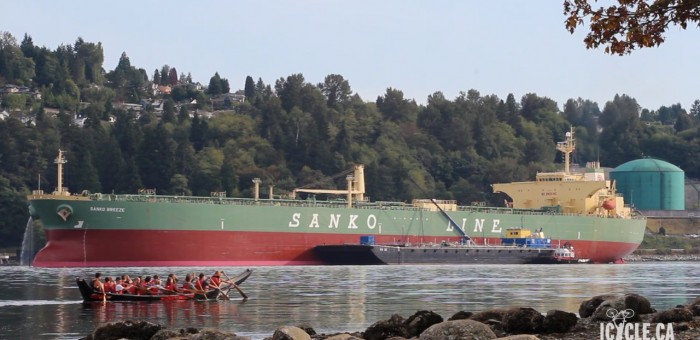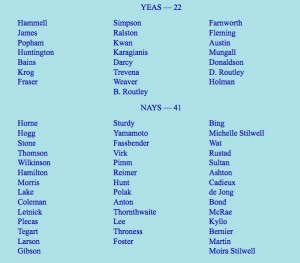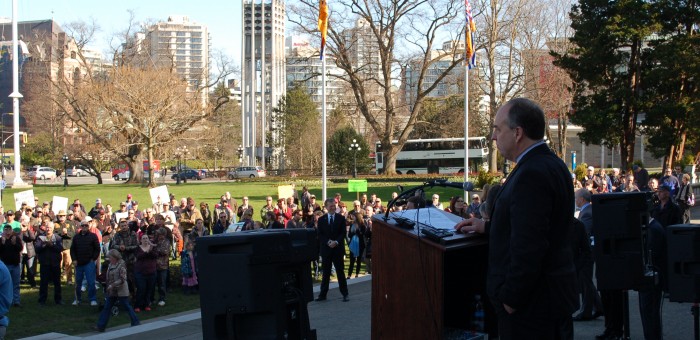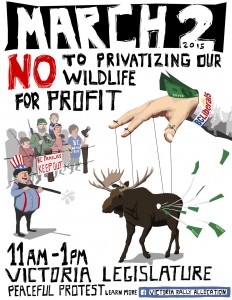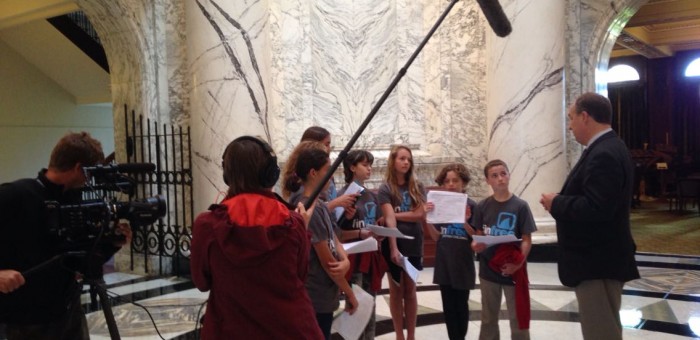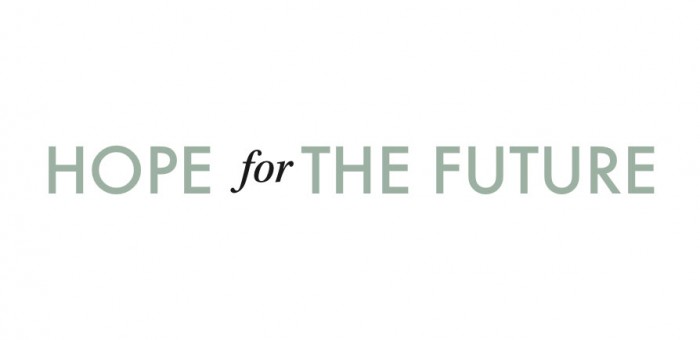Environment
Trying to Protect the BC coast from expansion of thermal coal & diluted bitumen exports
During the committee stage of Bill 12, The Federal Port Development Act on Thursday afternoon, I put forth a number of amendments in an attempt to protect the British Columbia coast from the expansion of thermal coal and heavy oil (diluted bitumen) exports. These were the amendments mentioned in my earlier post on Bill 12. All amendments were defeated. Below I provide a brief excerpt from Hansard.
First Amendment
A. Weaver: With respect to the minister, the reason I have troubles with this legislation is…. We are not debating the Canada Marine Act. I will come to that.
Under the Canada Marine Act, the federal government can sell federal land in a port to a port authority, which could be administered by the province of British Columbia. In selling the land to the port authority, the Species at Risk Act and the Canadian Environmental Assessment Act no longer have any jurisdiction because the land is no longer owned by the federal government. It is now within the port authority, administered by the province of British Columbia.
My concern, therefore, with respect to an undertaking is that heavy oil or thermal coal experts would then no longer have to worry about Species at Risk or Canadian Environmental Assessment Act implications in any development there. The problem with that is that we don’t have anything in the province of British Columbia as a Species at Risk Act.
In essence, what’s happening in accepting an agreement like this, through an undertaking involving either coal or heavy oil, as we will discuss in section 3, is we are essentially saying that we in British Columbia can exempt such development from the federal Species at Risk Act and we have nothing to fall upon here in British Columbia. We can fall on the Environmental Assessment Act.
Frankly, with respect to what we’ve seen with Kinder Morgan and Enbridge, the province has done an admirable job in terms of representing the interests of British Columbia. I have not seen that with respect to thermal coal, and for this reason I do have two amendments I would like to bring here to specifically exclude from ‘undertaking’.
[To amend as follows:
By adding the text shown as underlined:
Section 1
“undertaking” means an undertaking, or an undertaking in a class, designated for the purposes of section 64.1(2)(a) of the Canada Marine Act; excluding an undertaking, or an undertaking in a class, relating to the import or export of thermal coal.]
That is the first amendment I so move.
The Chair: The amendment was proposed by the member for Oak Bay–Gordon Head. It reads: “‘undertaking’ means an undertaking, or an undertaking in a class, designated for the purposes of section 64.1 (2)(a) of the Canada Marine Act, excluding an undertaking, or an undertaking in a class, relating to the import or export of thermal coal.”
Amendment negatived on the following division:
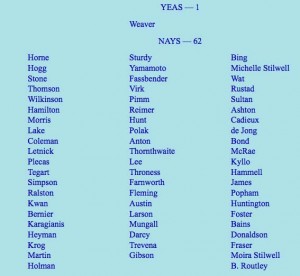
The Chair: Hon. Members, stay in your seats. The member is going to move another amendment.
Second Amendment
A. Weaver: As I mentioned earlier, I have a legal backgrounder from West Coast Environmental Law, which talks about the passage of Canada Marine Act, which we’re talking with respect to the “undertaking” definition here.
That would significantly increase the powers of port authorities, allow the federal government to off-load its responsibility over shipping in federal ports, etc. The changes now allow port authorities to buy federal land and infrastructure from the government and then lease those lands to companies or authorize companies to use them for as long as the port authority has control over them.
Once sold, those lands would no longer be federal property, meaning they would not be subject to terrestrial species protection under the Species at Risk Act.
Seeing as we have no species at risk act here in British Columbia, this raises some concern, which is why I move, again, an amendment to amend as follows:
[By adding the text shown as underlined:
Section 1
“undertaking” means an undertaking, or an undertaking in a class, designated for the purposes of section 64.1 (2)(a) of the Canada Marine Act excluding an undertaking or an undertaking in a class relating to the import or export of heavy oil.]
In light of the fact that we do not import heavy oil that probably is moot, but certainly export is a big issue that’s facing us now.
The Chair: Hon. Members, if the House waives the time we will proceed right away. Do we have consent?
Leave granted.
Amendment negatived on the following division: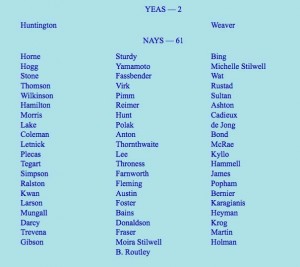
Third Amendment
A. Weaver: Thank you to the minister for the answer. My concern here is that the province would enter an agreement and potentially get into a position where the Species at Risk Act is not applicable or in force. I have an amendment here I’d like to move, which is to amend section 2 as follows:
[By adding the text shown as underlined:
Section 2
With the prior approval of the Lieutenant Governor in Council, a member of the Executive Council may enter into an agreement on behalf of the government.
If
(a) the province has first enacted provincial legislation comparable in power and scope to the Species at Risk Act (S.C. 2002, c. 29), and
(b) any and all port developments subject to the agreement that would have previously triggered a review under the Species at Risk Act (S.C. 2002, c. 29) prior to the royal assent of Bill C-43 (2014), automatically trigger a review under the legislation referenced in subsection (a).]
On the amendment.
A. Weaver: This is a piece of legislation trying to ensure that British Columbia enforces species-at-risk legislation. If it doesn’t enforce the federal one — which it can’t, of course — it has to produce its own if it’s going to enter an agreement as per the discussion here.
The Chair: Hon. Members, it’s an amendment moved by the member for Oak Bay–Gordon Head regarding the Species at Risk Act.
Amendment negatived on the following division:
Private Member’s Bill Tabled to End Trophy Hunting in B.C.
On Monday, March 2nd, I tabled a bill that restricts the practices of non-resident trophy hunters coming to B.C. to kill large game by making two specific amendments to the Wildlife Act.
The proposed changes remove grizzly bears from the list of animals exempt from meat harvesting regulations and ensure all edible portions of game animals killed in B.C. are taken directly to the hunter’s residence.
As the legislation currently stands, it is illegal to waste meat when hunting in B.C., unless the animal you have killed is a cougar, wolf, lynx, bobcat, wolverine, or grizzly bear. The edible parts of big game animals must be removed from the animal and packed out to one’s home, or importantly for non-resident hunters, to a meat cutter or a cold storage plant. These last two options provide trophy hunters with legal meat laundering opportunities. By adding “directly or through” to the clause hunters can still use meat cutters and cold storage plants to process their harvests, but it can’t end there. The meat must make it to their home address. If they want to donate that meat to charity after the fact they are welcome to do so, but they have to take it home first.
Hunters are already required to remove the edible portions from black bears, if enacted, this bill would bring meat harvesting standards for grizzly bears up to the same level.
For local sustenance hunters – the vast majority of hunters in B.C. – this bill merely echoes what they are already doing; harvesting wild game to bring the meat home to feed themselves and their families. For non-resident trophy hunters coming to B.C. to bag an animal for its hide, skull, or antlers this poses a larger logistical challenge of exporting large quantities of meat.
The purpose of this Bill is to provide the government with another tool to address the growing concerns about trophy hunting in our province. As with any tool the government develops, its effectiveness is entirely dependent on government’s commitment to using it as it was designed. If government were to pass this bill, but fail to enforce its provisions, or provide regulatory loopholes for guide outfitters, then its purpose will be undermined. It will be up to government to make a commitment to embracing the values that are at the heart of this Bill and using them in a meaningful manner.
This is not a perfect solution, of course, but it is an achievable step in the right direction of protecting the interests of sustenance hunters while reducing the wasteful influence of non-resident hunters who come to our province to kill our wildlife acting with disregard for its value as a food source. It is also a strong legislative move towards conserving grizzly bear populations in B.C. as it forces the government to reevaluate its outdated grizzly hunting mandate. It shows the current government that we are serious about conserving grizzly bears through working collaboratively with conservation organizations like the British Columbia Wildlife Federation, BC’s First Nations and BC’s resident hunters.
Brown bears, of which grizzlies are the North American subspecies, were once found on four continents, making them one of the most widespread mammal populations in the world. Their original range included Europe, North Africa, northern and central Asia, the Middle East, and North America. Today, they are locally extinct or endangered across the map — except in Russia, Alaska, and B.C.
According to the provincial government’s 2002 report on B.C. grizzly bears, in North America healthy grizzly bear populations once extended from northern Mexico to the Yukon, and from the West Coast to Hudson Bay. As human populations began to expand, grizzly numbers steadily declined as their habitat became fragmented, their food sources threatened, and they were killed for recreation and for getting too close to the people who were moving into their territory.
British Columbia and Alaska are the last strongholds of grizzly bear populations on the planet, though the exact numbers are contested because the bear’s solitary and roaming nature makes them difficult and expensive to study. The B.C. government estimates there are 15,000 grizzly bears in the province today, some independent scientists and First Nations groups think there could be as few as 6,000.
Precise population number aside, the global trend for brown bears is clearly one that favours extinction. The Himalayan brown bear has dwindled to two per cent of its former range and there are an estimated 49 brown bears left in Italy. Mexico’s grizzlies are now extinct and the last known Californian grizzly was shot in the 1920s. The Liberal government maintains the fate of B.C.’s grizzly bears will be different, but the government’s scientific justifications for the hunt in some regions are harshly criticized by many local and international scientists.
Like Canada’s polar bears, B.C.’s grizzly bears have been listed as a “species of special concern” by the Committee on the Status of Endangered Wildlife in Canada (COSEWIC). Unlike their Arctic cousins, though, grizzly bears don’t qualify for federally legislated conservation measures.
In addition to the unrelenting pressure brought by climate change, industrial expansion, and habitat destruction, this iconic species is pursued by “hunters” who come to B.C. to kill a prize bear. The importation of B.C. grizzly bear parts into the European Union has been banned for over a decade because they think the hunt is being unsustainably managed. The wealthy non-resident hunters who come to our province to buy a grizzly trophy, therefore, are predominantly from the U.S. They cut off the bear’s head, paws, and fur but leave the bodies behind to rot.
This so-called sport has been banned by nine coastal First Nations and is opposed by nearly 90 percent of British Columbians. Importantly, 95 percent of hunters surveyed in the province-wide McAllister Research poll also agreed that people should not be hunting if they are not prepared to eat what they kill.
I support sustainable, respectful sustenance hunting in British Columbia that is grounded in a science-based conservation policy. It with this in mind that I introduced the Bill today.
This bill is an attempt to bring the environmental and hunting communities together. Many urban environmentalists don’t realize that BC hunters and their supporting organizations (like BCWF, Ducks Unlimited and Fish and Wildlife organizations) are some of the most active conservationalists. At the same time, some hunters believe that most urban environmentalists are out to stop hunting. The reality is that almost everyone I have spoken with is on the same page. They support hunting for food. They don’t support hunting only for trophies. This bill supports the former and penalizes the later.
Supporting BC’s Resident Hunters
On December 10th, 2014 the Minister of Forests, Lands and Natural Resource Operations released his decision concerning how hunting licenses would be allocated between industry and resident British Columbia hunters. After consulting with constituents and stakeholders, I released a media statement raising concerns that the interests of resident British Columbia hunters were being set aside in favour of special industry interests. A few days later, I provided a more thorough analysis of the issues involved.
On February 6, amidst widespread pressure from BC resident hunters and the BC Wildlife Federation, the government revised its decision on wildlife harvest allocations slightly. But this was not enough.
Today, BC’s resident hunters held a rally on the Legislature lawn. I had the privilege of speaking at the rally and I reproduce the text of my speech below.
I also had honour of presenting a petition from over 16,000 British Columbians on behalf of the British Columbia Wildlife Federation today. The text of the petition is reproduced here:
“We, the undersigned, representing residents of British Columbia and supporters of resident hunting in the province, state that changes to the Province’s Wildlife Harvest Allocation Policy announced in December 2014 provide an unwarranted larger share of hunting permits to BC’s professional guides and outfitters, who primarily guide non-resident trophy hunters, at the expense of BC resident hunters.
The wildlife allocation made available to Guide Outfitters Association of BC members is unprecedented in North America and there is no economic justification for these allocation changes, which will adversely affect BC’s resident hunters.
We, the undersigned, respectfully request that the provincial government repeal the changes to the Wildlife Harvest Allocation Policy announced on December 10, 2014 by the Minister of Forests, Lands and Natural Resource Operations and limit non-resident hunters and Guide Outfitters Association of BC members to the Wildlife Harvest Allocation specified in the 2007 Wildlife Allocation Policy.“
Finally, today I introduced my first Private Member’s Bill: the Wildlife Amendment Act. My introduction is reproduced below. We’ve written up a more thorough discussion of the implications of the bill elsewhere.
Speech at the BC Resident Hunter Rally in Victoria
I’d like to begin by thanking all of you for coming to the legislature today. I know a lot of you had to travel quite far and take time off work to be here. But I am glad that you did. This issue is too important to let it quietly slip off the public radar and I commend you for being here today; for speaking up on behalf of hunters across BC; and for realizing that the February adjustment to the allocation policy was simply not good enough. It was little more than a patronizing response to your heartfelt feedback and concern for the future of hunting in BC.
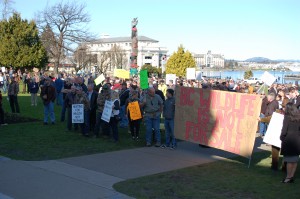 The erosion of hunter’s access to BC game is yet another example of government putting the needs of special interests ahead of those of British Columbians. Hunting is a foundational part of life for many people in BC. As you all know so well, it is way to connect with nature, spend quality time with your loved ones, and provide a clean, healthy source of protein for your families. Having that connection to one’s food, knowing its true value, and appreciating where it came from means that you have a profound understanding of the importance of conservation.
The erosion of hunter’s access to BC game is yet another example of government putting the needs of special interests ahead of those of British Columbians. Hunting is a foundational part of life for many people in BC. As you all know so well, it is way to connect with nature, spend quality time with your loved ones, and provide a clean, healthy source of protein for your families. Having that connection to one’s food, knowing its true value, and appreciating where it came from means that you have a profound understanding of the importance of conservation.
It has been a great honour for me to work closely with the B.C. Wildlife Federation – the province’s largest conservation organization – as I attempted to educate myself on allocation issues over the past few months.
Hunters in B.C. have had a rich history of conservation in our province, working tirelessly to ensure animal populations are healthy, abundant, and that their habitats are protected.
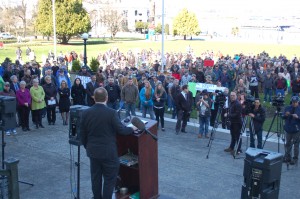 Despite running on a “families first” platform, the BC Liberal government has continued to put the vested interests of a select profitable few ahead of its own residents. In the hunting sector especially, we have seen a steady erosion of your rights as they continue to be reallocated to the guide outfitting industry.
Despite running on a “families first” platform, the BC Liberal government has continued to put the vested interests of a select profitable few ahead of its own residents. In the hunting sector especially, we have seen a steady erosion of your rights as they continue to be reallocated to the guide outfitting industry.
The December hunting permit amendment may have been the straw that broke the camel’s back, so to speak, but the BC government has been making the shift towards prioritizing the needs of industry over its own residents for the last decade.
The government’s actions have not been guided by the values of British Columbians. Nor have they been guided by independent expert advice. The numbers put forward in December weren’t even close to the allocation splits recommended by the ministry.
What troubles me is that according to the lobbyist registrar, the Guide Outfitters Association has had over 2,000 person meetings with government officials since 2011. Quite a number of them included Premier Clark.
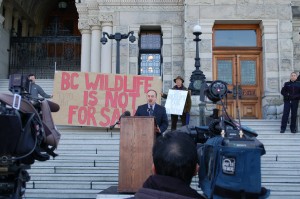 It’s clear that government has an ear to the concerns of guide outfitters.
It’s clear that government has an ear to the concerns of guide outfitters.
But today and together we’re here to say to government that that’s not enough. Together we are demanding that government listen to British Colmbians, the people that they are supposed to represent.
The increased allocation of BC’s wildlife to guide outfitters is an issue that affects all of us, not just the people here today.
I look forward to tabling the BCWF petition opposing the permit allocation amendments shortly. That should help government understand just how many people care about the unfair treatment of resident BC hunters.
I will also be tabling a bill that, if enacted, would make trophy hunting for non-residents more difficult by requiring them to remove the meat from their kills and transport it back to their home address.
For local sustenance hunters – the vast majority of hunters in B.C. – this bill merely echoes what they are already doing; harvesting wild game to bring the meat home to feed themselves and their families. For non-resident trophy hunters coming to B.C. in search of antlers or a hide this poses a larger logistical challenge of exporting large quantities of meat.
It is not a perfect solution to our problems, of course, but it will make the government engage in a conversation about where their interests lie and emphasize the importance of supporting sustainable, respectful hunting practices in our province — practices that are embodied by BC’s resident hunters and the BC Wildlife Federation.
Thank you.
Introduction of the Wildlife Amendment Act
I move introduction of the Wildlife Amendment Act for first reading.
It gives me great pleasure to introduce this bill that, if enacted, would restrict the practices of non-resident trophy hunters who come to B.C. to kill large game by making two specific amendments to the Wildlife Act.
The proposed changes remove grizzly bears from the list of animals exempt from meat harvesting regulations and ensure that all edible portions of animals harvested in B.C. are taken directly to the hunter’s residence.
As the legislation currently stands, the edible parts of big game animals (except cougars, wolves, lynx, bobcats, wolverines, and grizzly bears) must be removed from the animal and packed out to one’s home, or importantly for non-resident hunters, to a meat cutter or a cold storage plant. These last two options provide trophy hunters with legal meat laundering opportunities. By adding “directly or through” to the clause, hunters can still use meat cutters and cold storage plants to process their harvests, but it can’t end there. The meat must make it to their home address. If they want to donate that meat to charity after the fact they are welcome to do so, but they have to take it home first.
Hunters are already required to remove the edible portions from black bears. If enacted, this bill would bring meat harvesting standards for grizzly bears up to the same standard.
British Columbians, and in particular BC resident hunters, support these change. A 2013 McAllister Research poll found that 88% of British Columbians oppose trophy hunting. In addition to that, 95% of hunters said they believe you should not be hunting if you are not prepared to eat what you kill.
For local sustenance hunters – the vast majority of hunters in B.C. – this bill merely echoes what they are already doing; harvesting wild game to bring the meat home to feed their families. For non-resident trophy hunters coming to B.C. to kill an animal only for its hide, skull, or antlers this poses a logistical challenge of exporting large quantities of meat.
I look forward to second reading of the bill.
I move that this bill be placed on the orders of the day for second reading at the next sitting of the House.
Banning the sale of shark fins: Response from the Minister
In November the Minister of Agriculture committed to meeting with me to discuss how British Columbia could end the sale, trade and distribution of shark fins in British Columbia. We subsequently met and at the meeting I promised to put together a package of information that he committed to pass along to Ministry staff for a thorough review.
Shortly after the meeting, I presented the Minister with a binder containing detailed and comprehensive information outlining the rationale for implementing legislation to ban the sale, trade and distribution of shark fins.
Yesterday, I received the Minister’s response that I reproduce below.
I am disappointed with the response. The Minister did not respond to my specific question as to whether the government would consider introducing legislation to ban the sale, trade and distribution of shark fins in British Columbia. In the legal opinion I tabled in the Legislature and provided to the Minister, this is an area that falls within provincial jurisdiction. Instead the Minister deferred to federal jurisdiction concerning what can be imported into Canada and what can be harvested in our coastal waters.
Sadly, this response is not what I was hoping for.
Presenting a Hopeful Vision for British Columbia
Today in the legislature I offered a new vision for British Columbia in my response to the Speech from the Throne.
It is clear from the Throne Speech and the NDP’s amendment, that we are lacking leadership and vision in the legislature. We have a government completely out of ideas and an Official Opposition that is more focused on pointing out the government’s failures than offering viable solutions.
In my speech, I laid out my vision for a diversified, sustainable, 21st century economy, in contrast to the Liberal government’s preoccupation with the elusive LNG industry. In offering my vision, I highlighted the importance of prioritizing affordability, health care, education and environmental regulation.
I presented evidence-based options to improve MSP, advance the cleantech and other sectors, bolster environmental regulation, and help B.C. teachers. I offered my ideas as a first step towards solving a large number of the province’s growing challenges.
In my view it is disrespectful to deliver a Speech from the Throne to British Columbians completely void of ideas when so many people are struggling to get by and when so many solutions exist. At the same time, opposition has to be more than standing on the sidelines and lobbing dirt at the government. I hope the ideas that I put forward can assist us move towards developing lasting solutions to the problems and challenges facing British Columbians.
Below is the text of my speech. I welcome your comments and ideas.
Preamble
Honourable speaker, last week as I sat through the throne speech it became apparent to me that this government is now without a vision, at a loss for new ideas and completely struggling for a new direction. Their promise of wealth and prosperity for one and all through an LNG message of hope wrapped in hyperbole has not materialized.
Honourable speaker, last year at this time, during the speech from the throne to open the 2nd session of this parliament, the government mentioned LNG ten times. LNG was mentioned only eight times in last fall’s throne speech and now, at the opening of the 4th session, we only find passing reference to LNG five times.
But here’s what’s different Honourable Speaker. In those two previous speeches the word ‘diverse’ was not used a single time. Now, as the government attempts to downplay their irresponsible LNG promises they’ve introduced reference to a diverse economy, sectors or resources eight times!
Honourable speaker, you will recall that for two years now I have been saying the same thing. The economics did not and still does not support the government’s reckless LNG promises in a market oversupplied with natural gas and in a jurisdiction that is years behind others in terms of developing an LNG industry. I’ve stood alone in this house repeatedly attempting to steer the government on a more sustainable path.
Last fall, I went so far as to propose an amendment to the throne speech by including the words:
And that the Legislative Assembly of British Columbia accepts the responsibility of demonstrating the leadership to choose growth, to move forward and create a legacy for our children, but also recognizes that this leadership means not gambling our future prosperity on a hypothetical windfall from LNG, and instead supports the development of a diversified, sustainable, 21st century economy.
In light of the new direction this government is struggling to find, I find it profoundly ironic that they voted against my amendment. What’s even more remarkable is so did the official opposition.
Today, in this chamber, I will offer British Columbians an alternate vision for the future of British Columbia — A vision that is grounded in evidence and at all times puts the interests of British Columbians first.
Introduction
It has been nearly two years since I decided to run for office.
When I made that decision, I did so because I saw an opportunity.
I had spent years studying the possibilities that are available to those societies who are first to act boldly in transitioning to a low carbon economy. In my classes, I would cite statistics, like how in the United States in 2011, green jobs grew at four times the rate of all other sectors combined. Or how between 2007 and 2010, the global market for environmental technology and resource efficiency expanded at an average rate of 11.8 percent per annum.
I advised governments at all levels on the policies they could take at the time to seize those opportunities. And I saw British Columbia begin to show leadership in doing just that.
But as the government then shifted all of its efforts, and all of its hopes, to the LNG pipedream, I saw us lose that leadership. I watched as we went from leaders in developing a 21st Century economy, to laggards, scurrying back to the 20th century, hoping for an out-dated and unrealistic LNG windfall.
As I watched that leadership unravel, I was reminded of something I would tell my students. If you want your government to show leadership on the issues you care about, I would tell them, you need to elect people who will act on your concerns. Or, if you feel like none of the candidates is seriously addressing the issues you are worried about, you should run for office yourself.
Ultimately, I decided that it was time to take my own advice. I ran for office because I saw an opportunity to use my role as an MLA to help build a vision that would put our province on a path to develop a 21st Century economy. Now, after nearly two years, I feel this is more important than ever.
In the shadows of the massive challenges that we face, our province needs new leadership.
Leadership that offers a vision for how to make peoples’ lives better.
Leadership that pushes boldly forward when no one else will, because they see the opportunities — economically, socially and environmentally — to be the first to end homelessness, the first to act on climate change and the first to transition to a 21st century economy.
Leadership that’s willing to be a lightning rod in the legislature, when that’s what’s necessary, and to advance reasonable, common sense ideas that can help address British Columbians’ pressing concerns.
Leadership doesn’t wait for public opinion — it builds it.
If there is one clear message from the Throne Speech it’s that this legislature has lost its leadership. And British Columbians are paying the price.
We have a government that is out of ideas and an Official Opposition that is bent on criticism when, more than ever, what we need is vision and an honest conversation about the challenges we face and the solutions available to address them.
We have built a political culture that puts personal ego, political games and partisan rhetoric ahead of the most important obligation we as elected representatives have: To provide leadership and direction to move British Columbia forward. We have been tasked with addressing the greatest challenges of our time — not adding to them.
Yet, too often the pursuit of narrow self interest trumps the interests of British Columbians. This is because most of us in this room will not have to live with the long-term consequences of the decisions that we make.
We have to do better. And doing better starts with a basic willingness to work across party lines.
I have always said that I will support a good idea when I see it, I will contribute to a poor idea when I can help make it better and I will oppose a bad idea when that’s what’s necessary.
But steadfast opposition is a last resort. Our challenges are too big, and the consequences are too profound. Opposition has to be more than standing on the sidelines and lobbing dirt until the government is buried and broken. There’s no vision—no leadership—in slinging mud. We don’t have to agree, but we do need to have honest discussions that extend beyond partisan squabbles. And we need to demonstrate the respect we expect to receive towards our ideas, when we consider the ideas of others.
We expect more from government. We expect a demonstrated commitment to govern for all British Columbians —not merely for those who voted for them—or funded them. This means an honest and open commitment to seek out the perspectives and ideas of others and evaluate them based on their merits, not on their source. It is disrespectful of British Columbians to be presented with a throne speech completely void of ideas when so many people are struggling to get by and when so many solutions exist. It speaks to the lack of leadership in this government that they did not do more to actively seek out and try to incorporate the ideas of others —particularly when they were so lacking on ideas themselves.
We have to do better. Being an MLA — whether in opposition or in government — has to be about more than partisan squabbles and staying in power.
I find myself between two parties, each of which has institutionalized disrespect for the ideas, and in some cases the existence, of the other. We must return to debating the challenges facing our province — including those that began under an NDP government, those that began under a Liberal government, and those that began before either was ever in power. Let us now demonstrate the leadership that British Columbians expect of us and begin to discuss concrete ideas that, by working together, we can turn into the solutions we need to the challenges we face.
21st Century Economy
Let’s start with the economy.
We have a unique opportunity in British Columbia to be at the cutting edge in the development of a 21st century economy.
Our high quality of life and beautiful natural environment attract some of the best and brightest from around the globe —we are a destination of choice. Our high school students are consistently top ranked — with the OECD specifying BC as one of the smartest academic jurisdictions in the world. And we have incredible potential to create clean, renewable energy sectors to sustain our growing economy. When we speak about developing a 21st century economy — one that is innovative, resilient, diverse, and sustainable — these are unique strengths we should be leveraging.
Unfortunately, instead of investing in a 21st Century economy, our government has banked all its hopes on an irresponsible, unrealistic fossil fuel windfall, with its Liquefied Natural Gas sector. We are already seeing these promises unravel. I’ve been saying this was inevitable for more than 2 years. Now more than ever, we have an urgency to invest in a 21st century economy, so B.C. can continue to prosper. Here’s where we could start:
A 21st Century economy is sustainable — environmentally, socially and financially. We should be investing in up-and-coming sectors like the clean tech sector that create well-paying, long-term, local jobs and that grow our economy without sacrificing our environment.
Similarly, by steadily increasing emissions pricing, we can send a signal to the market that incentivises innovation and the transition to a low carbon economy. The funding could be transferred to municipalities across the province so that they might have the resources to deal with their aging infrastructure and growing transportation barriers.
By investing in the replacement of aging infrastructure in communities throughout the province we stimulate local economies and create jobs. By moving to this polluter-pays model of revenue generation for municipalities, we reduce the burden on regressive property taxes. Done right, this model would lead to municipalities actually reducing property taxes, thereby benefitting home owners, fixed-income seniors, landlords and their tenants.
Yes, we should be investing in trade skills, as described, for example, under the B.C. jobs plan. But we should also be investing further in education for 21st century industries like biotech, high tech and clean tech.
Natural gas has an important role to play. But, we should use it to build our domestic market and explore options around using it to power local transport. BC businesses such as Westport Innovations and Vedder Transport have already positioned British Columbia as an innovative global leader in this area.
We could invest in innovation in the aquaculture industry, like the land-based technologies used by the Namgis First Nation on Vancouver Island who raise Atlantic salmon without compromising wild stocks.
The logging industry is booming as we send record amounts of unprocessed logs overseas. Now is the time to retool mills to foster a value-added second growth forestry industry.
These are just a few ideas that could help us move to the cutting edge in 21st the century economy. Fundamental to all of these ideas is the need to ensure that economic opportunities are done in partnership with First Nations.
Environment
The continued prosperity of 21st century extractive industries, like mining, which are critical to BC’s economy, require a strong and enduring social license to operate. Government has a crucial leadership role to play in this area. British Columbians are looking to their government to ensure that resource projects in B.C. prosper safely, responsibly and sustainably.
Unfortunately, over the last decade the BC government has weakened environmental monitoring expectations to dangerous levels that have cast dark shadows over our province’s extractive industries. From 2009 to 2014, the number of Government Licensed Science Officers – like foresters, geoscientists, and engineers — in government service dropped by 15 per cent and their work has been discontinued, diluted, or contracted out to the private sector.
When we fail to adequately monitor and inspect industrial activities, environmental disasters – like the tailings pond breach at the Mount Polley mine – occur, threatening the reputation of the entire industry and making it more difficult for projects to earn that essential social license. This needs to change.
Government Licensed Science Officers, have been, and could continue to be, our environmental safety net — when resourced properly they ensure that as our province prospers. And it does so with an eye to environmental stewardship and public safety. Reinvesting in keeping these positions in house, helps ensure government has the experience necessary to ensure we prosper safely.
If industries are going to thrive with a social license, we must ensure the environmental review process is stringent and upholds the highest standards, instead of being a symbolic or political rubber stamp process. We just have to look to the National Energy Board hearings on the Trans Mountain pipeline project to see how a poor review process can completely undermine any hope of earning a social license.
The costs of prospering safely in British Columbia should be borne by those who are prospering from our rich natural resources. That’s why we should look at financing these changes through a small increase in the corporate income tax. British Columbia already has one of North America’s most competitive tax climates for businesses with one of the lowest corporate tax rates in Canada. The Report of the Expert Panel on BC’s Business Tax Competitiveness found that a 0.5% increase of the general corporate income tax rate could generate $147 million a year.
These are small changes that could make a big difference in assuring British Columbians that their government is taking leadership to ensure resource industries prosper safely.
Affordability
A 21st century economy must also be an affordable one.
Right now, over half a million British Columbians are currently living in poverty. Of this number, over 160,000 are children. Four B.C. cities have recently been ranked among the five least affordable cities in Canada.
The government responds to these facts with the same old mantra: It can’t do more until the economy grows. Yet, we hear year after year from the government that the economy is growing, and this year we even have more than a $444 million budget surplus.
The fact is, we have seen growth, we have money to invest, and we know that if we invest capital smartly we will actually save in operating costs. So let me offer a few ideas of where we could start:
The Official Opposition has advocated for ending the atrocious policy of clawing back income supports for single mothers. It’s not an expensive change, but it’s an important one, so let’s start here.
Let’s also fix the Registered Disability Savings Plans and Registered Educational Savings Plans. Currently, RDSPs and RESPs do not receive the same protection that RRSPs and RRIFs do when a family or individual is faced with bankruptcy. This means that when faced with bankruptcy, these already vulnerable individuals lose the one thing that would otherwise provide a glimmer of hope for a financially stable future. By simply providing creditor protection for disabled individuals and children’s education funds we can make the pathway out of poverty that much easier for those individuals experiencing bankruptcy. And let me be clear: This is a policy change—it doesn’t cost anything.
At the same time we know from other jurisdictions, that by providing chronically homeless individuals with a home through Housing First Policies, we not only provide individuals with a basic human right – shelter – but also better health outcomes, all while realizing long-term, overall net savings to government.
Medicine Hat saw a 26% decrease in emergency shelter use in just four years and has housed over 800 people, including over 200 children. Utah has reduced chronic homelessness by 72% as of 2014. A housing first pilot project in Denver, Colorado found emergency related costs and incarceration costs declined by 72.95% and 76% respectively, while emergency shelter costs were reduced by an average of $13,600 per person. Canada’s own At Home/Chez Soi study found that for every $10 invested in housing first services there was an average savings of $21.72.
The solutions to our province’s affordability crisis are out there, and those solutions themselves are affordable. We just need to invest in them. Given everything we know, the question becomes this: how can we afford not to?
Health Care
The need for affordability must extend to quality health care too.
We can be proud that B.C. was recently ranked the healthiest province in Canada. This ranking shines a positive light on the healthy lifestyle choices British Columbians make each day. Yet, while we celebrate our successes, we must also remember that our health care system faces serious challenges.
With a highly regressive health care funding system, an aging population, major gaps in primary care, and surgery waitlists lasting anywhere from months to years, it is time for government to take a serious look at how our Health Care System is funded and administered.
British Columbia is the only province in Canada that continues to charge MSP premiums. Such premiums unfairly burden low and fixed income British Columbians with an overly heavy tax burden. With individuals earning a net annual income of $30,000 paying the same monthly flat fee as those earning $3,000,000 per year, it is evident that MSP premiums are perhaps the most regressive form of taxation in B.C.
Instead of charging MSP premiums, we could look at shifting to alternative, more progressive options such as was done in Ontario and Quebec. Rather than flat-rate fees, health premiums can be paid through the personal income tax systems. This avoids the regressive effects of flat-rate premiums and diminishes the additional costs associated with administering the MSP program.
But it can’t stop there. We also need to address the growing gaps in primary care. Doctor shortages and long wait times to get an appointment have led to increased use of walk-in clinics and emergency room services. Unfortunately, this can be costly for both patients and our health system, as a lack of follow-up and co-ordination can mean problems are missed or poorly managed.
Let’s look at investing more in Nurse Practitioners to help close some of these gaps and provide the high quality and timely care that British Columbians pay for and need. Let’s find more effective ways of funding these Nurse Practitioners. Let’s re-examine our approach to the delivery of chronic care services. Relying on acute care services, such as walk-in clinics and hospital emergency rooms, to deal with chronic health issues is both costly and inefficient.
Let’s consider increasing community and at-home care programs, which have been shown to provide better care at a more affordable cost. And let’s lobby the Federal government for our fair share of Canadian Health Transfer revenue, a share that reflects our demographics and the actual cost of delivering health services.
The possibilities for improving our health care system are plenty. As our population continues to age and gaps in primary health care continue to grow, it is more important now than ever to commit to re-examining how we provide affordable, quality health care in B.C.
Education
Public education represents perhaps the most important investment government can make for the prosperity of our province. Each and every one of us has attended school and that experience has shaped who we are, what we do and how we contribute to society. And public education is absolutely critical in teaching the next generation of British Columbians to think critically, contribute responsibly to society, and become the leaders of tomorrow.
Given this, why have we not shown more leadership in the Education sector?
At the end of the strike last fall, the government spoke about “an historic six-year agreement…which means five years of labour peace ahead of us.”
The implication of this sound bite is NOT that government is stepping up to the task of finding new ways to fund and deliver a leading public education system. The reality is that they are stepping back, allowing their dysfunctional relationship with teachers to simmer, only to boil over again in a few years.
We are stepping back despite an overall 18% and a whopping 44% aboriginal six-year high school non-completion rate. We have school boards at a loss for how to fund their operations due to seemingly endless budget cuts. Surely this is not indicative of a government properly valuing publication education.
It is time for the government to take leadership.
Leadership means ensuring that the resources needed for success are provided. Over the last 13 years, education funding as a percentage of provincial GDP has declined from a high of about 6.4% to an estimated low of about 5.0%. This is not indicative of a government that is prioritizing education. We need to find new, progressive funding sources to reinvest in education.
Leadership means acknowledging that behind the curtain of the BCPSEA is the provincial government. Yet it is the government, not BCPSEA, that draws the lines in the sand on funding. By dismantling the BCSPEA and bringing its operations back into government, a signal could be sent that government is serious in developing a new relationship with teachers.
Leadership also requires a clear eyed assessment of what’s working, and what isn’t – and clearly a ‘one size fits all’ approach isn’t working. The needs on Haida Gwaii, are different from those on Vancouver Island which in turn are different from those in Surrey or Prince George. Now is the time to explore whether or not class size and composition negotiations are better conducted at the school district level instead of the provincial level.
The status quo on education isn’t addressing the growing challenges. We cannot wait until the next labour dispute. Now is the time to sit down with all those involved and start a dialogue about what a 21st century education system looks like, including how it is funded.
Conclusion
Honourable speaker, I’ve outlined an alternate direction that the province of British Columbia could and should be taking.
It’s a direction that puts the interests of British Columbians first, whether they be resident hunters, fishers, farmers, forestry workers, miners, educators, engineers, students or labourers, to name just a few examples.
Honourable Speaker, we have a government that is out of ideas, lacking leadership, creativity and innovation, and void of a vision.
Honourable Speaker, we have an official opposition that is almost exclusively focused on pointing out the government’s failures without ever offering viable solutions. Witness the amendment before us as a perfect example of this. And I quote:
“and that the Legislative Assembly of British Columbia regrets that the families in the province have seen their wages fall as they pay more for their basic services, while the government gives a break to the highest two per cent of income earners; regrets that the government has failed to meet its commitment that all British Columbians will have access to a general practitioner by 2015; regrets that seniors still do not have flexible options for home care or assisted living; regrets that young people in the province face uncertain job prospects as the government has bet on one sector rather than working with businesses and workers across B.C. to reach their potential; and regrets that the government will not fulfill its commitment for at least one LNG pipeline and terminal online in B.C. by 2015.”
Where are the solutions? We cannot stop at the word “regrets”, the key word littered throughout the proposed NDP amendment. Solving the concerns of British Columbians requires us to find solutions. And that starts with new ideas and new leadership.
Honourable Speaker, we have an official opposition that is also out of ideas, lacking leadership, creativity and innovation, and void of a vision.
And ultimately, Honourable Speaker, it is British Columbians who are paying the price for this lack of leadership from both parties.
There are too many people struggling in British Columbia for us to accept this status quo. There are too many incredible economic opportunities passing us by as we put all of our eggs in the LNG basket. To quote Preston Manning, “we are counting our chickens before the rooster even enters the hen house.”
We need real leadership in British Columbia and that starts with a willingness to offer new ideas, and to approach other peoples’ ideas constructively and with the same respect that we hope others will approach our ideas with. And that leadership could start here today by passing my subamendment that proposes adding the words:
“and recognizes that leadership in government requires a commitment to seek out and incorporate ideas from others, while leadership in opposition requires a commitment to offering solutions, and hence calls on this House to collaborate on the development of a new vision for British Columbia that builds on the good ideas of all members, regardless of their party affiliation.”
Thank you Honourable Speaker.

